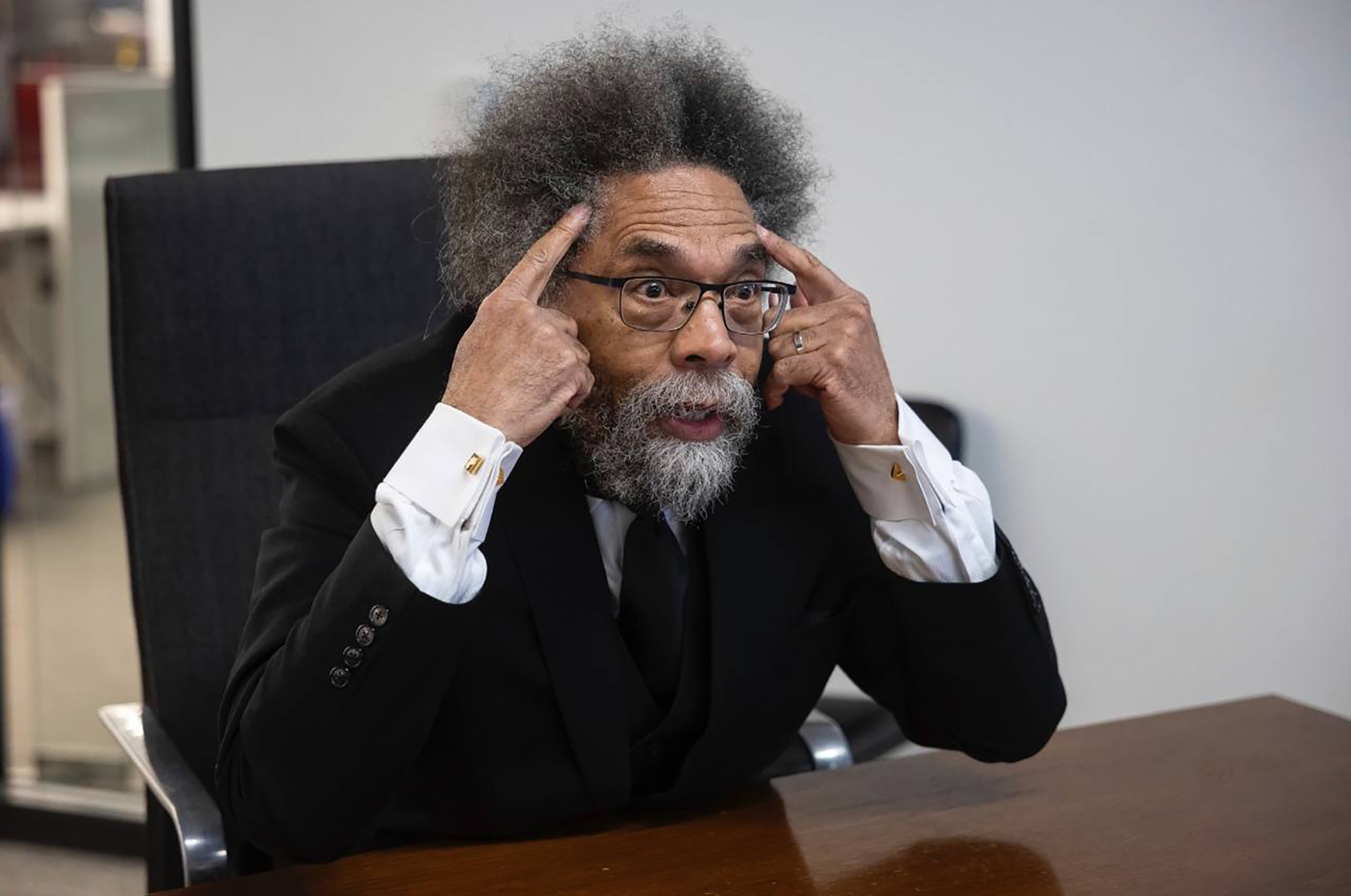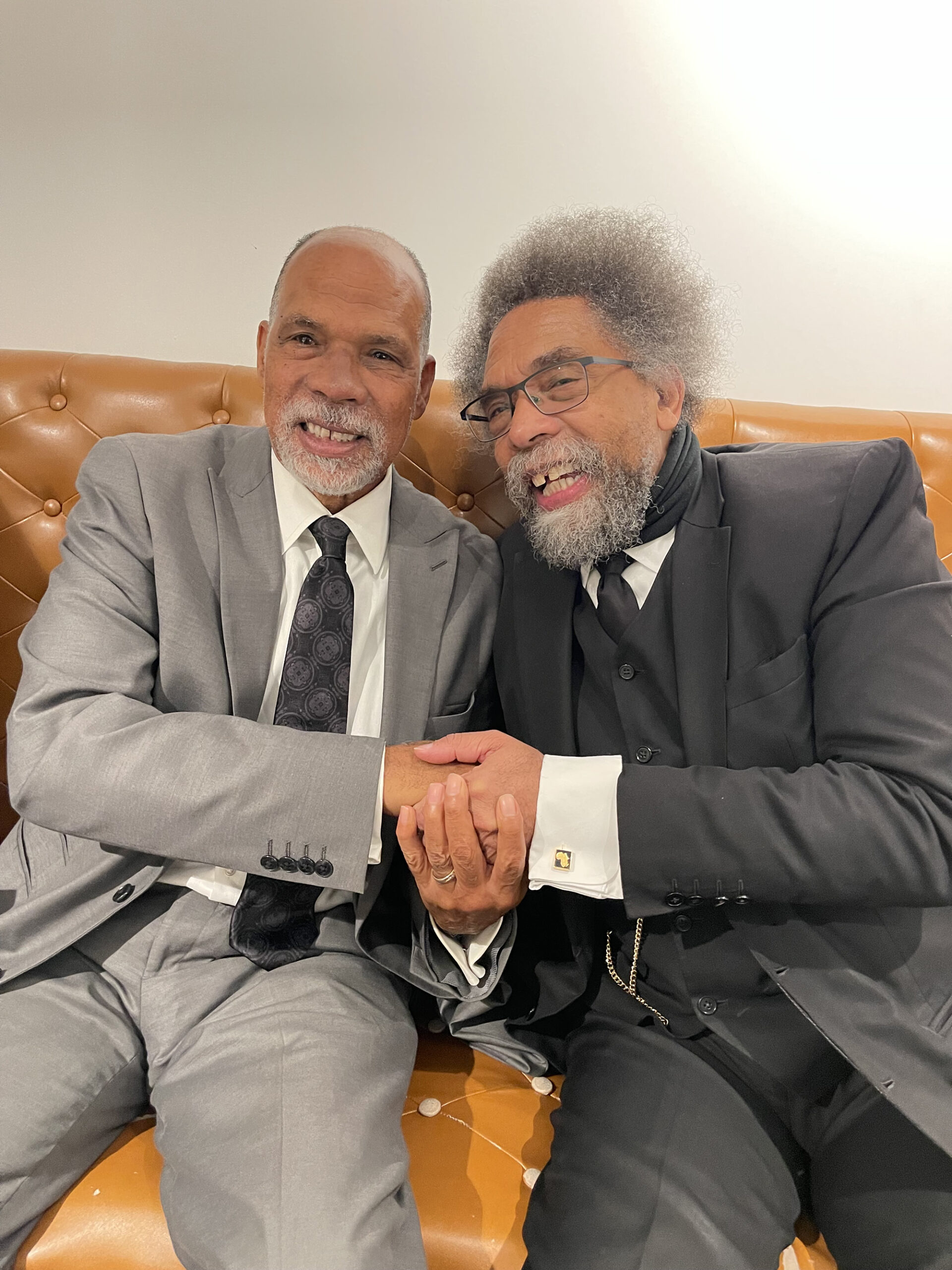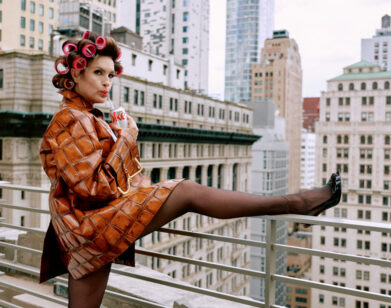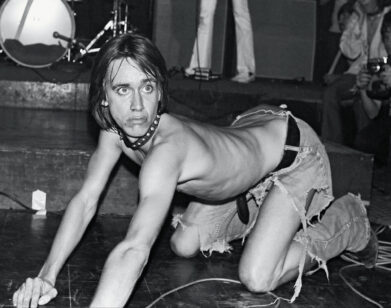CANDIDATE
This Election, Dr. Cornel West is Leading With Love

Dr. Cornel West at the Gifford Lectures, University of Edinburgh, 2024. Photos courtesy of Dr. Annahita Mahdavi West.
For decades, Dr. Cornel West has served as one the United States’ most visible and rousing public intellectuals. Having attended Harvard as an undergrad and been the first Black student at Princeton to earn a PhD in philosophy, he went on to merge his academic prowess with his strong religious faith—shaped by Shiloh Baptist Church outside of Sacramento, California—to create a stirring social philosophy all his own: one definitively on the left side of the spectrum, unafraid to critique those in power in the fight for equality and justice. In his multifarious career he’s been a beloved Ivy League professor, an activist, a theorist, and a champion of public protests. (He even famously appeared in The Matrix franchise.) As of June 5, 2023, he can also add “presidential candidate” to his resume, with a platform that espouses equality for all, bristles against Big Business as usual, and celebrates the transformative act of caring for one another as humans rather than the transactional relationships to which late capitalism reduces us. Dr. West took time off the campaign trail to talk to his big brother Clifton about growing up, the power of music, and the real revolution awaiting our country.
———
TUESDAY 3 PM JULY 9, 2024 CAMBRIDGE, MA
CLIFTON WEST: Hello, hello.
CORNEL WEST: Big Clif. The one and only. Looking sharp there, brother.
CLIFTON: Oh, and you always. Yes, sir. What a blessing. We could start on any subject, but I’m going to let you start off driving and pick it up from there like we have always done.
CORNEL: I’ll start off with the inimitable, majestic, and sublime Irene B. West and Clifton Lincoln West Jr.—mom and dad—and of course, you, Clifton Lincoln West III. I’m your younger brother, and we got Cynthia and Cheryl. “So it’s a family affair,” as Sly Stone says. When you really think of who we are, it is so fundamentally grounded in the shaping and molding, the loving, the laughing, the guiding and guarding of Irene and Clif. For us to reflect on who we are has so much to do with that past shaping the present and continually giving birth every day to the future.
CLIFTON: Yeah. To think about all the things that had to be in play to get to this moment of you making, not just a run for president, but a serious run for it. That perfect storm of being born in the South: I was born in Port Arthur, Texas. Three years later, you were born in Tulsa, Oklahoma. Two years after that, Cynthia was born in Topeka, Kansas. I started school with Brown v. Board of Education. I was part of that first class that started school in 1955 after its passing in ’54. Then moving to Sacramento, where Cheryl was born in Glen Elder. That’s where we learned so much of who we are—how we did and did not fit into this Pilgrim land called America. And then growing up in Shiloh Baptist Church. So much had to be in play for this person that we now know as Cornel Ronald West. It’s almost like a collision of certain components. And in order for anything to be more than what it is, there has to be some suffering. But it all results in you being a force for good and engaging people to become agencies for justice for all. I think a hundred years from now, some child is going to ask, “Great, great-grandpa, where were you when this man tried to reveal to us a love that we ought to have for one another, when he tried to attack the problem that was at hand at that time, that we’re now suffering for because we didn’t listen to him? What were you doing, great-grandpa?”
CORNEL: Lord, lord, lord. When I think about how deep our Christian faith actually is, it’s almost like the skin on our bodies or like mom’s love and dad’s embrace of us. It goes far beyond dogma, far beyond doctrine. It’s the shaping of a soul, a kind of soulcraft. Both you and I were born in Jim Crow America. America had been lying about itself in terms of its vicious legacy of white supremacy. It talked about how successful it was, how decent it was, but you still had lynching going on. You still had massive degradation going on. You had institutionalized hatred going on. Then you jump to 2024 and you hear similar language. There’s always been decent individuals who have been struggling against that denial, against that illusion. But when I think of mom and dad saying, “I want you to be forces for integrity, honesty, decency, truth-telling, justice-seeking, woundhealing, and joy-spreading,” that kind of soulcraft really has to do with character, to use just basic Emerson’s language. When Dad took me to Harvard, his main thing was, “It’s not just a matter of the grades. More than anything else, I want you to be a decent, loving human being.” That is a tradition that goes back to Harriet Tubman here and John Coltrane here. [Points to portraits of them hanging on the office wall behind him] Now, all of us are going to fall on our faces. Ain’t no doubt about that, because we’re human beings. We’re wretched as well as wonderful. But where we are now in 2024, almost everywhere you look in terms of the right side of America and of the world, the genocides and the poverty, social misery and so on, we end up cutting radically against the grain, no, brother.
CLIFTON: It’s about holding onto love no matter what. Some things we go through just because we are Black, but most things we go through because we are human. Those devices and forces can invite us to stop loving or to love less, but you have to fight that, because your only hope in life comes from your capacity to love, and god is love.
CORNEL: You lead with love. So to be a prisoner of love is to lead with love and be a lover unto death, which means then that no matter how ugly things are, you’re never surprised by evil or paralyzed by despair. I think one of the great legacies that mom and dad gave us was enough spiritual and moral resources that we would never, ever give up, cave in, sell out, but continually fight, keep swinging, keep loving and laughing, keep moving forward. That is something that cuts so radically against the grain of our day, because you’ve got so much organized greed that’s running so much of the world in terms of the oligopolies and the monopolies, the predatory capitalist processes, the obsession with short-term profit. Then you’ve got weaponized hatred of people who are deeply frustrated and feel wounded, and in response to that frustration oftentimes have contempt and hatred toward other people and end up devouring themselves.
CLIFTON: We live in transactional times. It’s more normalized in a way than it probably ever was, because so much is at stake. But I’m going to sit in the interview chair for a quick second and ask you a question, Cornel. We went through a debate two weeks ago—I call it more a debacle. But if you were on that stage with Trump and Biden, what do you believe you could have provided the American people and the world that the other two did not—maybe could not, but definitely did not!
CORNEL: I think I would’ve started off by saying America’s in deep spiritual decay and moral decadence. America has lost sight of the best of itself. America needs to be reintroduced to the best of itself. When I think of Martin King, Fannie Lou Hamer, Harriet Tubman, Rabbi [Abraham Joshua] Heschel, Edward Said, Dorothy Day, Anne Braden, I can go on and on. There is a tradition. It’s not that strong a tradition. It’s always been on the margins, but it represents a courageous attempt to pursue truth. The condition of truth is to allow suffering to speak. We would have to zero in on poverty in the nation. On the 62 percent living paycheck to paycheck in the richest nation in the world. On the one million or so precious folk who are homeless or unhoused at this moment. On the young people who are wrestling with all kinds of addictions, be it drugs or alcohol, because they’re able to get a sense of a better future. At the spiritual level, we’ve got to zero in on a culture that makes it difficult to cultivate the capacity to love—the vulnerability, intimacy, opening of one’s heart, mind, and soul. Feeling as if you can trust another in such a way that you put so much of your welfare in their hands and vice versa, cultivating the capacity not just to give, but the capacity to receive.
CLIFTON: Hello!
CORNEL: Here you’re talking about not just the best of America, but the best of the human species. One of the things I discovered when I studied philosophy was, when you look at the great figures, especially in the West—Socrates, Hamlet, many characters in Dostoevsky and Chekhov—they suffer from the under-cultivated capacity to love. Socrates never cries. He never sheds a tear. He’s got a great love of wisdom. I embrace that. He’s got a great commitment to intellectual integrity. I embrace that. But if you never cry and you never love anybody, you never open yourself to understand how tears can flow. When Jesus weeps and Socrates never weeps, that’s a radical difference because Jesus is manifesting what is the highest form of being human, which is to love and be loved. Now, the West family comes along, that’s our primary orientation, cultivating the capacity to love. It becomes a womb-to-tomb affair, up, down, round and round—trials and tribulations and all of the different failures and successes, but that fundamental thrust at the deeper levels of our soul is there. Why? Well, part of it has to do with Black people, a great people who have been so hated for 400 years, but taught the world so much about love. That’s where the music comes in, from [John] Coltrane’s “A Love Supreme,” to Stevie Wonder’s “Love’s in Need of Love Today,” to the O’Jays’ “The Love Train.” We can go on and on and on.
CLIFTON: If you were on that stage, America and the world would be introduced to experiencing or accepting a new paradigm, one we’ve been living in that has just been denigrated as time has gone on. So it’s about switching from this strictly transactional paradigm to a love paradigm. I truly believe that if everybody voting on that first Tuesday in November was somehow able to access you personally, either hearing you speak or being in your presence, Cornel, it would be a landslide. I believe you would be our next president of the United States. Of course, we know that everybody’s not going to have that opportunity, but what you’re offering in this new paradigm is something that everyone needs, and it’s an awakening to a hunger that has existed but has been pushed to the margins, because it can’t be commodified in the society in which we live right now. But when exposed to it, it’s inevitable that the guards will go down. Not for everybody, but I believe for most, because I’ve seen it happen over and over and over again in all kinds of different settings—in settings where you had far-right Ku Klux Klansmen, all the way to the militant brothers, to every kind of ethnic persuasion, political persuasion, religious persuasion. I’ve seen that force of good and I’ve seen the effect that it has on people. Getting people to be able to receive that kind of good is one of the things that you do better than anyone else.
CORNEL: I think that’s a description of your life, Clif. It would be wonderful to be one-half the human being that you are, but that’s my own testament.
CLIFTON: If you are Willie Mays, I’m not even Roberto Clemente. I might be Frank Robinson. No, I’m Reggie Jackson. No, I’m not a Hall of Famer. You’re Willie Mays and I’m Jimmy Davenport. Put it like that.
CORNEL: You’ll be Curt Flood, a great, great athlete, but also a freedom fighter who put pressure on the owners so that the players had access to some money and cash and resources. But to get back to the paradigm shift you’re talking about, and what it really means to run for truth and justice and love in the present moment, when the American Empire is undergoing such decline and decay with military overreach—there are trillions of dollars available for wars and military operations, but very little left for high-quality education, high-quality housing, high-quality health care. But to lead with love and to love unto death usually has a cruciform content to it. The world in which we live looks suspiciously on truth-tellers and justice-seekers. Because of greed, envy, and resentment, it tries to snuff them out. So we have a history of a country where they are assassinated, incarcerated, degraded, misunderstood, lied about—
CLIFTON: Or just marginalized. Exactly.
CORNEL: I think that’s always part and parcel of the calling. Now, as a Christian, it means just following Jesus. You’re going to follow Jesus into the temple and run out the money changers. You do it in the name of the poor, not because you hate the rich, you just hate greed. The greed is inside all human hearts. The hatred is inside all human hearts. But you’re trying to kill it every day. But there is that possibility of the cruciform surfacing with power, and that’s where you have to be willing to pay a price. You have to be willing to not just take a risk, but to bear a burden. I think more and more in our world, the dominant soulcraft is a market soulcraft. It’s success, career, the next opportunity, the next house, the next commodity, the next title, the next position, the next status. All of those are fine if they’re subordinate to some- thing grander. When you don’t have anything grander, they become idolaters. We live in a culture where idolatry is ubiquitous to the point that people think that’s what life is fundamentally about. It’s about just the gold rush. You end up worshiping the golden calf and transform the golden rule into, “He who has the gold rules.” You see, no society, no empire, can survive based on that. It’s going to self-destruct.
CLIFTON: We see that happening right now. I’m called a lot of times to be at people’s bedside during their waning moments on this side of time. Sometimes a person with a lot of money, very well-to-do. Other times it’s middle-class people, not so well-to-do, and sometimes it’s very poor. But it’s interesting during those last waning moments how much people have in common, because they realize now they can’t take all that stuff with them. So many times, they ask themselves, “Was it worth it?” You’re trying to comfort people and they’re going down a dark road, a road that is unknown and fearful, and we are all going to go there at one time. But what I would invite people to do is put their hands in god’s hands, because what you’re looking for is a light. Ultimately, at the end of this all, we just want to be safe. We want to be free of fear, and we want to be loved. That’s what it all comes down to.
CORNEL: No matter your gender or national identity or religion—
CLIFTON: Or how much money you have. It’s a human thing. And you want to bring people to that point of elucidation and enlightenment before the end, to where they’re asking, what has it really all been worth? Is this my best life? And if not, what is?
CORNEL: When you take that kind of profound wisdom into the political sphere, you end up with a transformation of politics. The politics following Machiavelli is about fear, insecurity, manipulation, domination, and short-term victory. You say, “Well, love breaks the back of fear.” If that’s the case, then you’re bringing into politics the very thing that the Machiavellians fear, which is the shift from transaction to transformation. You say, “Even my enemies, we’re clashing and it’s ugly, but I know they’re human beings. I know they’re insecure. I know they got mamas and daddies. I know they actually are searching for the same kind of love that I’m searching for, and therefore I still have a love connection to them, even though I have a deep conflictual relation to them politically.” If you’re going to love folk, then you love them not for them to love you back. That also is transactional and quid pro quo. You love them because they’re worthy of being loved. And that includes all those coming out of the 25th chapter of Matthew as well. The poor, brothers and sisters in the ghettos, in the hoods, of the barrio and the reservations. Wrestling with poverty, no matter what color or country. Same would be true in terms of wars, like Gaza right now. My god, nobody’s talking about Gaza. Isn’t that something?
CLIFTON: Yeah, they’re not anymore.
CORNEL: The mainstream press, oh no, they’re gone. All they want to talk about is Trump leading to fascism, which is real, but Biden himself enabling genocide, denying genocide, and them not raising a question about it? Well, our campaign, our calling, is to try to be holistic, to link foreign policy and domestic policy, to link the spiritual and the social, the personal and the political, the existential and the economic, and to keep the love at the center of it. That same soulcraft that you and I learned in the West household and Shiloh Baptist Church. It comes out of the best of the Black freedom tradition, the best of Black music, and in the end, the best of the species, because every culture, every civilization, going back to the early ones of Africa, had access to this deep commitment to loving others and cultivating the capacity to be loved and return that love.
CLIFTON: Thank god I was the older brother to someone who, at the core and every molecule of their being, was a lover of love and is a lover of love.
CORNEL: I just been trying to be like you all my life, so we’re two peas in a pod, brother. I sure thank you for this and we thank Interview magazine. You’ve allowed us to ask open questions, and given us this chance to talk one-on-one like this. We’ve never done this.
CLIFTON: Not in public.
CORNEL: It’s dynamite. Love you.
CLIFTON: Love you, Cornel. I’ll talk to you later.
———
Special thanks to Irene and Clif.
Photos courtesy of Dr. Annahita Mahdavi West.








